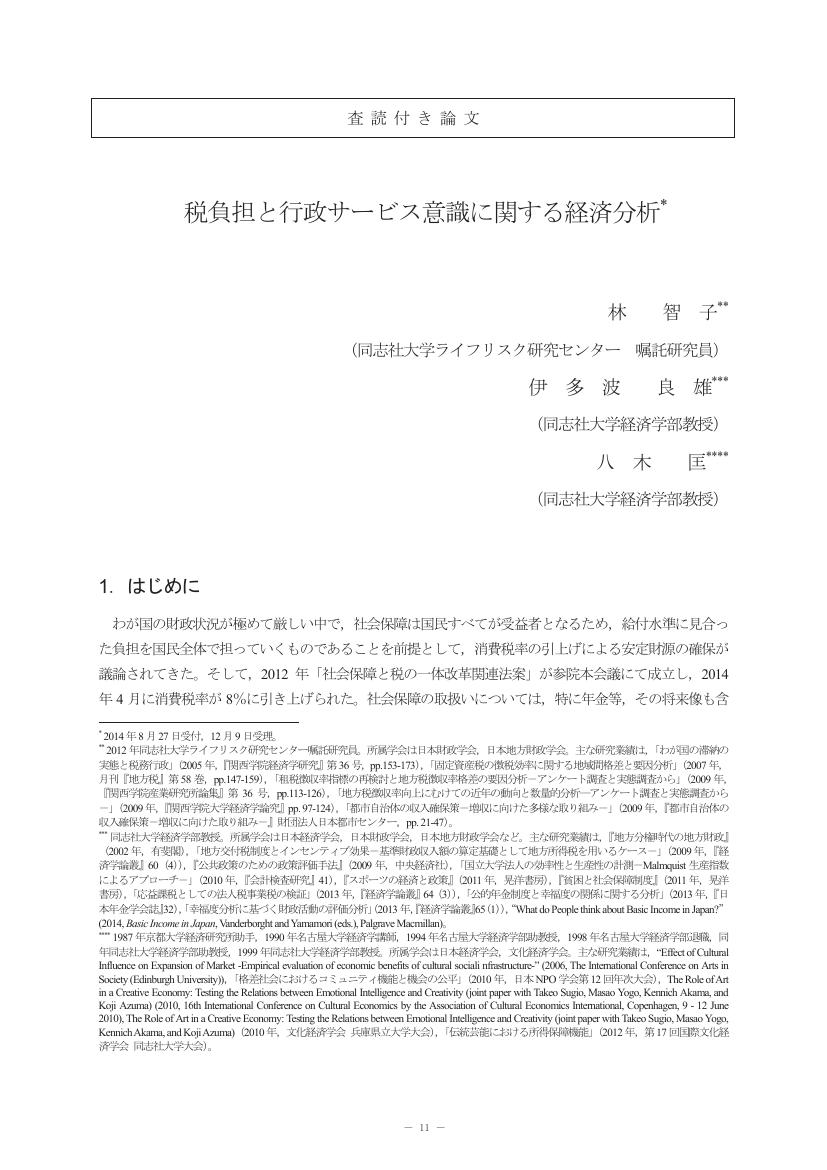3 0 0 0 OA 行動変容のメカニズムと政策的含意
- 著者
- 八木 匡 瓜生原 葉子
- 出版者
- 行動経済学会
- 雑誌
- 行動経済学 (ISSN:21853568)
- 巻号頁・発行日
- vol.12, pp.26-36, 2019-02-06 (Released:2019-01-31)
- 参考文献数
- 67
社会にとって望ましい行動を人々が常に行うわけではない.しかしながら,個人の選択と行動を社会的観点から変化させることは,個人の主体的意思決定を尊重するという立場からは,多くの人々が妥当性を認める問題に対して適用されるべきであり,その方法についても慎重な配慮がなされる必要がある.本章では,医療および健康行動における行動変容について議論を整理し,行動変容の基礎理論,社会的行動変容の神経科学的根拠を紹介する.最後に、臓器提供意思表示の事例を用いて,行動変容を可能にする戦略デザインについて議論を行う.
3 0 0 0 IR 理数系科目の学習に対する労働市場の評価
This paper uses data obtained from 13,059 respondents to an online survey examining disparitiess between initial employment performance (size & scale of company of initial recruitment, manner of employment) and current employment performance (current position, current salary) according to bias in science learning among science graduates and mathematics learning among humanities graduates. The impact of amendments made to the Japanese national curriculum guidelines is also considered. Survey results showed that, among science graduates, those who specialized in physics were recruited as full-time permanent employees of larger companies at a higher rate than graduates from other science disciplines. The proportion of physics graduates currently holding managerial positions was also high, as was their average annual income. For humanities graduates, those who had sat for admission examination(s) in mathematics had been recruited as full-time permanent employees of larger companies at a higher rate than graduates who had taken no admission examination(s) in mathematics. A higher proportion of graduates who had sat for admission examination(s) in mathematics held managerial positions than those who had not, and those who had taken mathematics examination(s) also had higher incomes. These findings agree with the results of previous surveys. An analysis by generation, carried out in order to gauge the impact of amendments to national curriculum guidelines, showed that science graduates who had specialized in physics and humanities graduates who had taken admission examination(s) in mathematics showed the smallest inter-generational disparity in income, suggesting that the impact on such graduates of changing the national curriculum guidelines to reduce coursework has been only minimal.
2 0 0 0 IR 高等学校における理科学習が就業に及ぼす影響 : 大卒就業者の所得データが示す証左
本稿では、大学卒業後の所得を分析することによって、理科学習の内容の変遷が、人的能力の形成と、労働者の労働市場における競争力にいかなる影響を及ぼすかを検証した。また、学習指導要領の変更がもたらした影響を分析するために、適用された学習指導要領別にサンプルを3分割(ゆとり以前世代、ゆとり世代、新学力観世代)して比較する。分析の結果、若年世代になるほど、換言すれば教科学習の軽減化に伴って、理数系科目の学習にしわ寄せがいき、得意科目ではなくなる(不得意科目になる)という傾向がうかがえた。また、物理学習がどの世代においても所得上昇に寄与することが確認され、稼得能力形成において重要な要因であることが示唆された。
2 0 0 0 OA 心理的コストとコミュニティ活動の最適性
- 著者
- 八木 匡
- 出版者
- 行動経済学会
- 雑誌
- 行動経済学 (ISSN:21853568)
- 巻号頁・発行日
- vol.5, pp.212-215, 2012 (Released:2013-05-29)
- 参考文献数
- 3
本稿では,コミュニティ活動への参加行動を,心理的コストを明示的に含んだモデルによって明らかにし,個々人の行動がコミュニティ活動の質に影響を与えるメカニズムを通じて,コミュニティ活動の価値を内生的に決定するプロセスの中で,どのような均衡が生まれるかを分析し,心理的コストが社会的非効率性をもたらすメカニズムを明らかにする.
1 0 0 0 OA 税負担と行政サービス意識に関する経済分析
1 0 0 0 OA パネルディスカッション「ディープデータによる感性マーケティングの可能性」
- 著者
- 八木 匡 清水 聰 高山 文博 Norbert Leuret 吉川 稔
- 出版者
- 行動経済学会
- 雑誌
- 行動経済学 (ISSN:21853568)
- 巻号頁・発行日
- vol.10, no.Special_issue, pp.S46-S57, 2017 (Released:2018-06-01)
1 0 0 0 中級 教育と格差(vol.10)教育の地域間格差
- 著者
- 橘木 俊詔 八木 匡
- 出版者
- 日本評論社
- 雑誌
- 経済セミナー (ISSN:0386992X)
- 巻号頁・発行日
- no.645, pp.100-109, 2009-01

